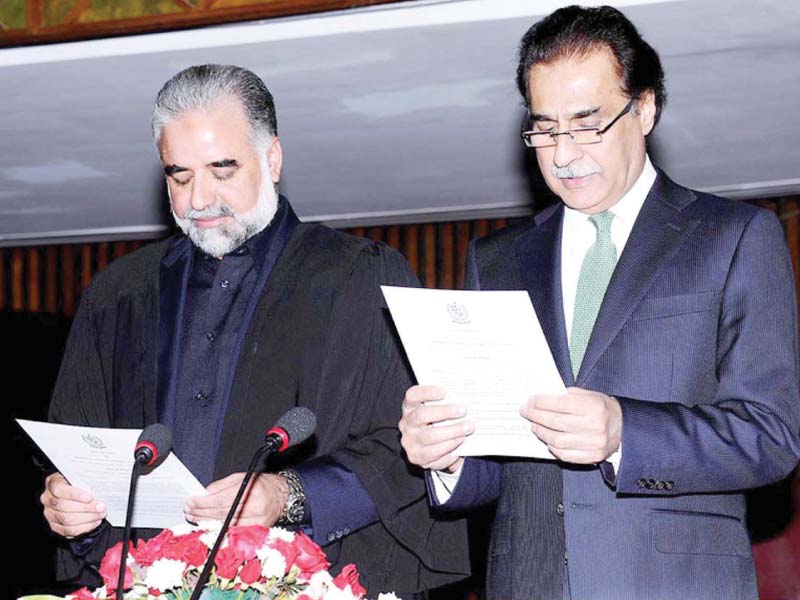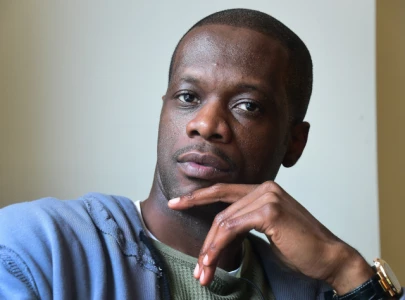
Sardar Ayaz Sadiq has again donned the robe he doffed nearly three months ago. He was re-elected as custodian of the lower house of parliament by lawmakers in an unprecedented move on Monday. “We will protect parliament and the Constitution,” said a visibly radiant Sadiq upon his re-election.
Sadiq, a senior member of the ruling Pakistan Muslim League-Nawaz, had defeated PTI chief Imran Khan in the 2013 parliamentary elections from NA-122 (Lahore V). Imran cried foul and challenged the results in an election tribunal. The proceedings dragged on for more than two years. And on August 22, the tribunal finally ruled against Sadiq ordering re-polling in the constituency. Sadiq contested again, this time against PTI’s Aleem Khan, and reclaimed his lost seat in parliament.
His victory margin in the by-poll shrank considerably, but his popularity among the federal lawmakers has apparently increased. He secured more votes in Monday’s election compared to the last time he was elected National Assembly speaker. Lawmakers from all but one parliamentary party voted for Sadiq.
Announcing the results, acting speaker Murtaza Javed Abbasi said Sadiq secured 268 out of the 300 votes polled. His only challenger, Shafqat Mehmood of Imran Khan’s PTI, could bag only 31 votes. The PTI could not enlist the support of any opposition group. Not only that, its allies in the Khyber-Pakhtunkhwa government – Jamaat-e-Islami and Aftab Ahmed Sherpao’s Qaumi Wattan Party, also voted for Sadiq.
Of all the votes cast in Monday’s secret balloting, one was declared invalid. The disgruntled or disillusioned lawmaker whose vote was declared invalid scribbled on his vote sentences against parliament and democracy. This prompted the National Assembly Secretariat to investigate the matter. It says it will seek help from forensic and writing experts to identify the member.
The first time Sadiq ran for the coveted office in 2013, he had secured 258 votes – but back then there were three contestants in the race – from PML-N, PTI and MQM. While the PTI has apparently alienated most political parties, the PML-N managed to muster the support of its bitter breakaway faction, the PML-Q of the Chaudhrys of Gujrat. And political analysts call it an important development in the country’s politics.

In 2013, the PPP – the second largest party in the house – had withdrawn its candidate in favour of the PML-N nominee. This time it did not field a candidate and instead announced support for Sadiq. Before the session began, Khursheed Shah, the leader of opposition in the National Assembly, said the PPP lawmakers would vote for Sadiq for his person and not because of his party.
Prime Minister Nawaz Sharif was the first to cast his vote when the balloting started. Imran Khan came to the house, cast his vote and left soon after.
“I thank Almighty Allah for my re-election. This is the first time in Pakistan’s parliamentary history that a National Assembly speaker has been re-elected by the same assembly,” Sadiq said after the results were announced. “Together we will defend democracy and the Constitution.”
The PTI plans to move the Election Commission of Pakistan against Sadiq’s win in last month’s by-polls that the party claims was manipulated by the ruling party. However, PTI’s candidate for the speaker slot, Shafqat Mehmood, congratulated Sadiq on his re-election.
“A consensus should be developed on all national issues in parliament,” he said in his brief speech after the election process. “All parliamentarians should work for making the National Assembly functional instead of calling for all parties conferences.”
Mehmood called for bridging the ever-increasing gap between parliament and the masses. Similar views were expressed by almost all senior leaders of opposition parties in their congratulatory speeches.
Coming back to business after the speaker’s election, the National Assembly passed the SBP Amendment Bill 2015, giving more autonomy to the central bank.
Published in The Express Tribune, November 10th, 2015.

















COMMENTS
Comments are moderated and generally will be posted if they are on-topic and not abusive.
For more information, please see our Comments FAQ